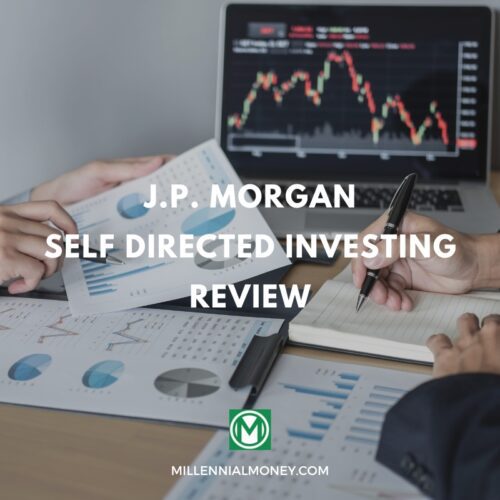Founded in 1922, Edward Jones is a St. Louis, Missouri-based full-service brokerage firm. Edward Jones is one of the most recognized names in the industry.
They’re an all-in-one personal finance management service.
Edward Jones Services Offered Include:
- Wealth Management
- Retirement Savings
- College Savings
- Stocks, Bonds, Mutual Funds
- Insurance, Annuities
- Cash and Credit Management Services
About Edward Jones
The company focuses on servicing individuals, small business owners and their employees, and self-employed clients.
While their fees are higher than most discount brokers or robo-bankers, their clients are willing to pay extra for access to a wide range of services.
Specifically, personalized guidance, and face-to-face interactions with their advisors.
The firm selects investment vehicles such as:
- Stocks, bonds, CDs, mutual funds,
- Exchange-traded funds (ETFs,) and
- Unit Investment Trusts (UITs)
It selects these on its clients’ behalf according to a buy-and-hold philosophy, prioritizing reliability and long-term growth of the investment.
As such, the firm’s clientele tends to be people who want to invest for long-term financial planning (e.g., retirement) rather than short-term plays.
How Does Edward Jones Work?
Your financial advisor will ask you a series of questions to determine your financial priorities. This is how the process begins.
The advisor will then build an investment strategy and construct a portfolio of stocks, bonds, and mutual funds based on a long-term buy-and-hold approach, taking into account your investment goals, risk tolerance, and other factors.
Edward Jones offers a variety of account options, including regular taxable brokerage accounts, traditional IRA, Roth IRA, 401(k), college savings account, and more to meet the needs of different clients.
Here’s an Example:
- Their Guided Solutions program is for clients who want to be more hands-on.
- Meanwhile, their Advisor Solutions products allow clients to leave daily decisions to their advisors.
The Client Consultation Group service offers access to a group of specialized professionals that can assist your advisor in creating a wealth management plan.
The Estate Planning and Trust Services focus on developing a legacy in addition to managing current financial needs.
They offer many account types, all structured differently, with varying minimum account sizes.
For example, the Guided Solutions Flex Account has a minimum asset value of $25,000 while the Guided Solution Fund Account only requires a minimum of $5,000.
Fees
A fee is charged when you invest with Edward Jones and the amount depends on the type of financial product you purchase.
For example, when you use a product in the Guided Solutions or Advisory Solutions category, your fee will be a percentage of the asset value in the account.
It ranges from 0.5% to 1.35% — the higher the asset value, the lower the fee rate.
Some products also require an additional fee, for instance, there’s an administrative fee for Advisory Solutions programs, an annual fee for an IRA, transaction fees for buying stocks, and a portfolio strategy fee.
Pros & Cons
Here’s what you should consider if you’re planning to invest with Edward Jones.
Pros:
- The firm has been in business since 1922 and received the highest score from J.D. Power 2021 Full-Service Investor Satisfaction Study.
- You can have a face-to-face meeting with an advisor virtually any time.
- It’s easy to find a local office as Edward Jones has over 16,000 branches around the country.
- Besides the $500,000 of coverage provided by the Securities Investor Protection Corporation (SIPC), Edward Jones purchases additional protection from underwriters at Lloyd’s to cover theft, misplacement, destruction, burglary, embezzlement, and abstraction of funds.
- The firm offers professional wealth management services backed by over 90 years of investment experience, which is tough to beat with DIY investing.
- Edward Jones offers a passive investment platform that professionally manages all your investment so you don’t have to spend time or attention on researching, keeping up with the market, or understanding complex investment vehicles.
Cons:
- Edward Jones’ fees are higher than the national median advisory fee.
- The firm has brokerage partnerships established with the mutual funds, 529 programs, and annuities it represents. That means it’ll receive revenue sharing payments when it makes purchases on behalf of its clients.
- Brokers at Edward Jones are paid on commission to execute trades, there are potential conflicts of interest in the brokerage model.
- In 2004, Edward Jones allegedly failed to communicate to clients it was recommending funds because it was offered payments instead of based on a rigorous fiduciary screening. As a result, the firm paid a $75 million regulatory settlement to the SEC.
- In 2018, Edward Jones was sued for pressuring its brokers to switch brokerage customers from commission accounts into advisory accounts that charge as much as 2% of assets annually (the national average was about 1% of assets.)
- The firm advocate’s front-end loads, a model in which investors pay for the advice upfront. However, academic research shows that load funds consistently underperform no-load funds. Also, most investors don’t hold a fund long enough for the upfront fee to pay off.
Frequently Asked Questions
Is Edward Jones a fiduciary?
Edward Jones is not a fiduciary investment advisor. Meaning, they’re not legally obligated to act in the best interests of the clients.
Some of the financial advisors at Edward Jones are registered as both brokers and investment advisors.
Sometimes they act in a fiduciary capacity and other times, they don’t. A practice that leads to even more confusion for the clients.
Is Edward Jones worth using?
As a client of Edward Jones, you can expect the firm to handle all your investments. So, its service is a great choice for those who want a hands-off approach to wealth management.
The firm’s long-term investment approach is a good option if you want to have an ongoing and consistent relationship with your financial advisor.
The higher fees also discourage active trading, making its programs more suitable for investors who aim at buy-and-hold investing.
Edward Jones’ fees are relatively high for smaller asset values. But, the annual management fee of 0.50% for accounts with balances greater than $10 million is competitive with robo-advisors.
Why are Edward Jones fees high?
Edward Jones maintains a lot of sales representatives, brokers, financial advisors, and real estate, which tends to be the primary reason why their fees are so high for clients.





No comments yet. Add your own